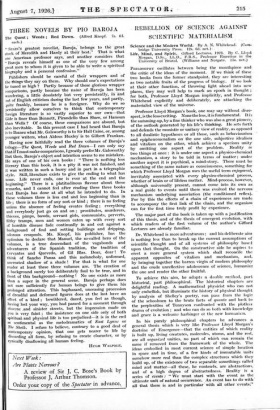THREE NOVELS BY PIO BAROJA
biography and a Personal confession."' Publishers should be careful of their wrappers and of the things-they say on them. Why should one's expectations
be tuned so high ? Partly because of these glorious wrapper comparisons, partly because the name of Baroja has been wandering, a little desolately bUt very persistently, in and out of English criticism during the last few years, and partly,
quite frankly, because he is a foreigner. Why do we so persistently allow ourselves to think that contemporary
foreign literature is so vastly superior to our own—that Gide is finer than Bennett, Pirandello than Shaw, or Hamsun than Wells ? Of course, these comparisons are absurd, but also inevitable. In this present case I had heard that Baroja is to Ibanez what Mr. Galsworthy is to Sir Hall Caine, or, among younger writers, what Aldous Huxley is to Gilbert Frankau.
Having now faithfully read the three volumes of Baroja's trilogy—The Quest, Weeds and Red Dawn—I can only say that if I must make comparisons, I greatly prefer Mr. Galsworthy But then, Baroja's object and intention seems to me mistaken. He says of one of his own boOks : " There is nothing less literary than this book, it is a pity it was not finished, and it was written in such a hurry and in part in a telegraphic style. Still, literature exists to give the ending to what has none. Life never ends, one is ever at the end and the beginning." There is a platitudinous flavour about these remarks, and I cannot feel after reading these three books that Baroja has done at all what he intended to do. In these voltimes there is less end and less beginning than in life ; there is no form of any sort or kind ; there is no feeling unless the absence of feeling creates feeling ; everything and everybody just go on and on ; prostitutes, murderers, thieves, pimps, bawds, servant girls, communists, perverts, filthy tramps, men and women eaten up with every sort of horrible disease fade continually in and out against a background of foul and rotting buildings and dripping, odorous cesspools. Mr. Knopf, his publisher, has the optimism to declare that Manuel, the so-called hero of the volumes, is a true descendant of the vagabonds and adventurers of the Spanish tradition, the tradition of Cervantes and Quevedo, of Gil Blas. Dear, dear ! To think of Sancho Panza and this melancholy, unformed, unrested shadow of a shade ! For that is what for one reader at least these three volumes are. The creation of a background surely too deliberately foul to be true, and in front of this background—nothing ! No one exists as more than a super in the general scene. Baroja perhaps does not care sulBciently for human beings to give them his prolonged attention. This haphazard, unceasing procession of dreadful and deformed figures does at the last have an effect of a kind ; bewildered, dazed, you feel as though, having lost your way, you had passed for a moment through obscene and sinister streets, but the impression made on you is very faint ; the insistence on one side only of both ripirituaL and physical -life is too prejudiced—it is in the end as sentimental as the melodramatics of East Lynne or The Sheik. I refuse to believe, contrary to a good deal of contemporary opinion, that one gets nearer to life by discarding all form, by refusing to create character, or by cynically disallowing all human feeling.
each.) _
" Snipes greatest novelist, Baroja,' belongs to the great stock of Meredith and Hardy at their best." That is what one American professor says, and another considers that " Baroja reveals himself as one of the very few among great men to whom it is given to be able to'write a-spiritual
HUGH WALPOLE.






































 Previous page
Previous page